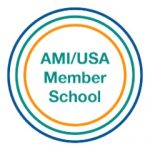1. What does Montessori mean?
It is an educational approach created by Dr. Maria Montessori, an Italian Physician in 1907. The curriculum respects the child’s natural development and offers independence and freedom with limits. The curriculum allows for self-construction and spontaneous activity. The classrooms are mixed aged, materials are hands-on, and lessons are individualized and realistic.
2. Will my child choose whatever he wants to do?
All Montessori lessons are initially introduced by the lead Guide (Directress) to insure the child’s readiness for the material and to lure the child to exciting new experiences. Once the child is successful working on the lesson independently he/she may choose it anytime it is available. Thus, providing the child freedom of choice. The child may not choose a lesson that has not yet been presented to him as he may not be yet ready for that lesson or level of challenge. The teacher will observe and introduce further challenging materials once the child has mastered the current lesson. Young students will have many new lessons with a teacher while older students who have had 2 – 3 years in the class will choose more independently throughout the five areas of curriculum.
3. Why mixed ages?
This combination allows for cooperation and mentor-ship. Older students guide the younger students, whom admire their older peer’s independence and leadership skills.
4. How do I know they are learning?
Classroom observations and Parent - Teacher Conferences are available throughout the year to discuss your child’s progress. Children on their own will share their experiences from the classroom. You will recognize in the child a sense of independence and caring for the community.
5. What does AMI mean?
Association Montessori International founded in 1929 by Maria Montessori to maintain the integrity of her work in developing the Montessori Method.
6. Does my child have to be independent in the bathroom?
In the Toddler Program (12 months - 3), children will be practicing (Toilet Learning) during class time with their Guides and peers.
Children entering the Primary (3 - 6) classroom must be independent in the bathroom.
7. How long do the students stay in Primary?
The Primary curriculum is a three to four year program depending on the individual child. For the best outcome of your child’s Primary Education, the child should enter at three and graduate out at six to six and a half. Thus, completing the Primary Curriculum Fully!
8. Will my five year old be challenged his/her third (kindergarten) year?
Yes, the advanced Primary curriculum will lead your student into in-depth experiences with Arithmetic; addition, multiplication, subtraction and division. Reading and writing skills are challenged with story writing and grammar lessons. Science, Geography, Botany, Zoology, Art and Music are very advanced and are all interconnected in the Montessori Curriculum. The third and fourth year is like the metamorphosis of the Butterfly. The Chrysalis cracks open and the educated child is revealed with a natural love of learning and strong sense of self!
9. Does my child need to attend 5 days?
Young children need consistency with their caregivers and peers in order to feel secure. Gaps in time between days off or out sick can make adjustments more difficult for the child. Therefore, five days are required in both Toddler and Primary programs.
10. How will my child transition to traditional school?
Montessori students completing the Primary 3 - 4 Year cycle have a strong foundation in academics and are most all reading at some level and practicing arithmetic with confidence and so academically it is most likely that your child will be advanced entering traditional first grade. Socially, Montessori kids have had the wonderful opportunity to be a part of a kind and thriving community and during their third year experienced being the leaders of the class. They are confident and have an inner knowledge of themselves. No matter where your child goes after Primary – they will be happy, open minded and prepared.

